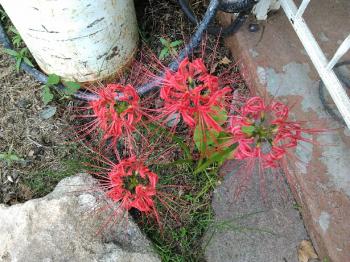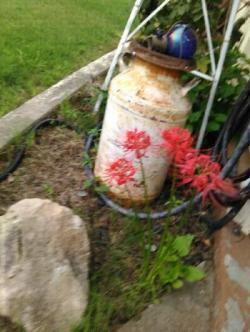October 1, 2016
1 - Exotic plants known as hurricane, spider, or surprise lilies may be grown in New Mexico.


Q.
Would you please share with me what kind of plant is shown in the attached pictures?
- Sandra L.
Eddy County
A.
The plants in the photograph you sent are specimens of Lycoris radiate. It has several common names such as surprise lily, spider lily, and hurricane lily. Its flowers appear quite suddenly in the late summer or fall after a rain hence the name surprise lily. The name hurricane lily is common in the Gulf Coast and Eastern states that can experience hurricanes. These flowers may appear following the rains from hurricanes. Actually the flowers appear after late summer rains and do not require a hurricane, but the name hurricane lily has stuck. The reason for the name spider lily is obvious from the appearance of the flowers with their numerous slender stamens appearing like spiders' legs.
Lycoris radiate is in the Amaryllis family along with several other species of Lycoris. Other Lycoris species may have yellow, gold, or pink flowers. They are native to Asia, but have been imported as desirable garden plants in the U.S. and other countries.
Some sources say that Lycoris radiata is not frost hardy, so it should not grow in New Mexico. However, the Missouri Botanical Garden states that it is hardy to USDA hardiness zone 5b. This indicates that it will grow in New Mexico. To be safe, plant these bulbs in a protected microclimate where the soil stays warm in the winter and perhaps cover with organic mulch. It prefers medium moisture (meaning irrigation is required in New Mexico) and a well-drained soil well amended with organic matter. The Missouri Botanic Garden site also advises planting shallowly with the neck of the bulb at or above the surface of the soil. Planting too deeply will prevent it from flowering. If grown in containers to move indoors during cold weather and colder parts of New Mexico, be advised that the plants will not prosper and probably not blossom in small containers.
I have seen the related, pink-flowering, Lycoris squamigera growing and flowering in Albuquerque. Note: The Lycoris bulbs are very poisonous.
You can find some interesting information about Lycoris radiate at Wikipedia.
Marisa Y. Thompson, PhD, is the Extension Horticulture Specialist, in the Department of Extension Plant Sciences at the New Mexico State University Los Lunas Agricultural Science Center, email: desertblooms@nmsu.edu, office: 505-865-7340, ext. 113.
Links:
For more gardening information, visit the NMSU Extension Horticulture page at Desert Blooms.
Send gardening questions to Southwest Yard and Garden - Attn: Dr. Marisa Thompson at desertblooms@nmsu.edu, or at the Desert Blooms Facebook page.
Please copy your County Extension Agent and indicate your county of residence when you submit your question!